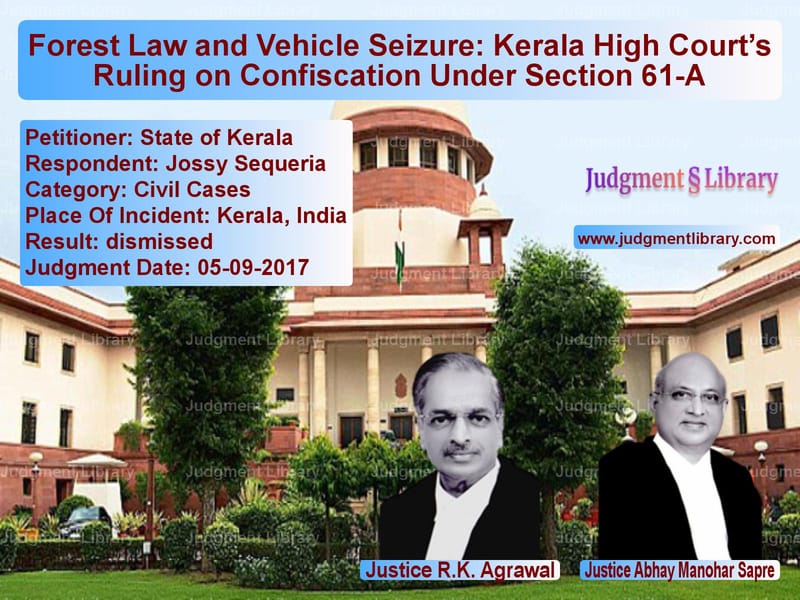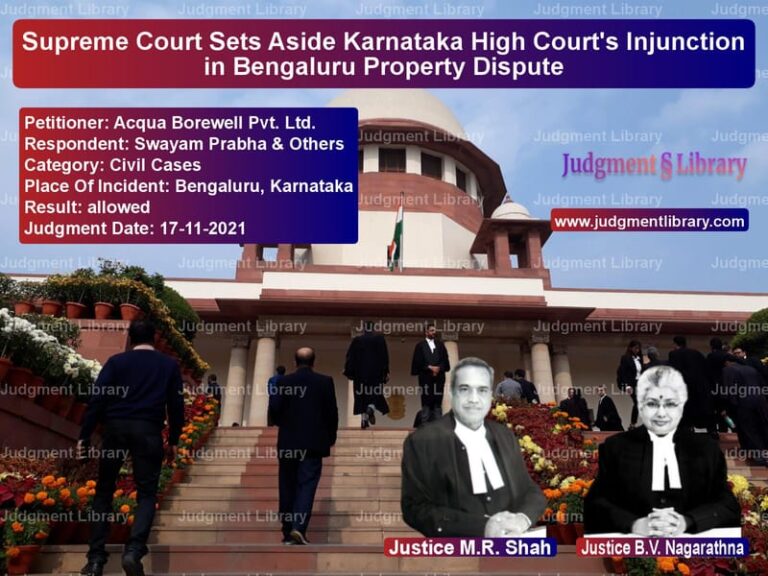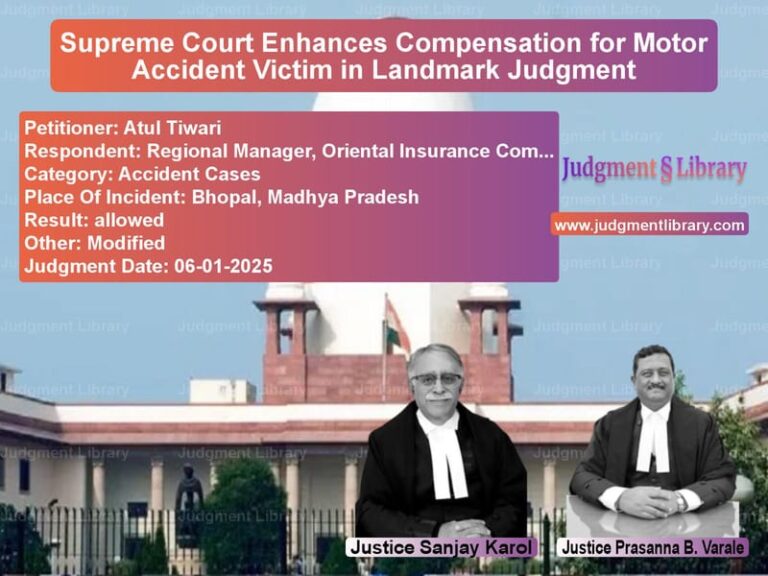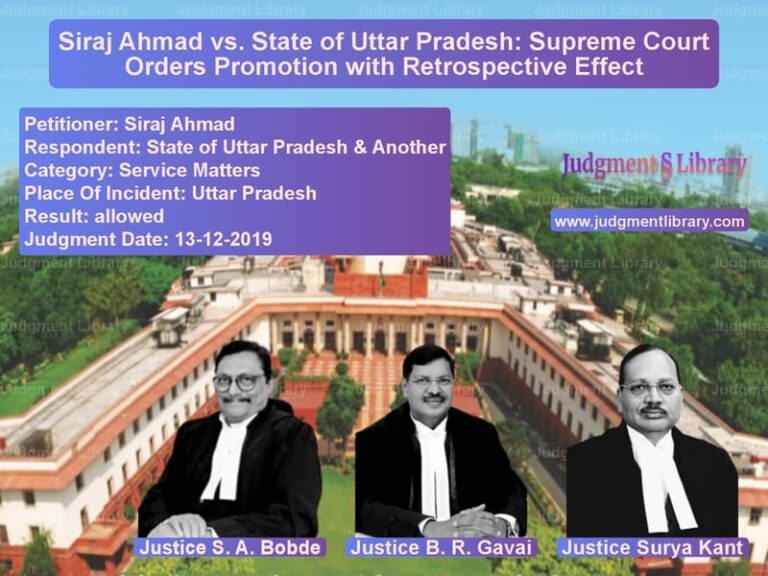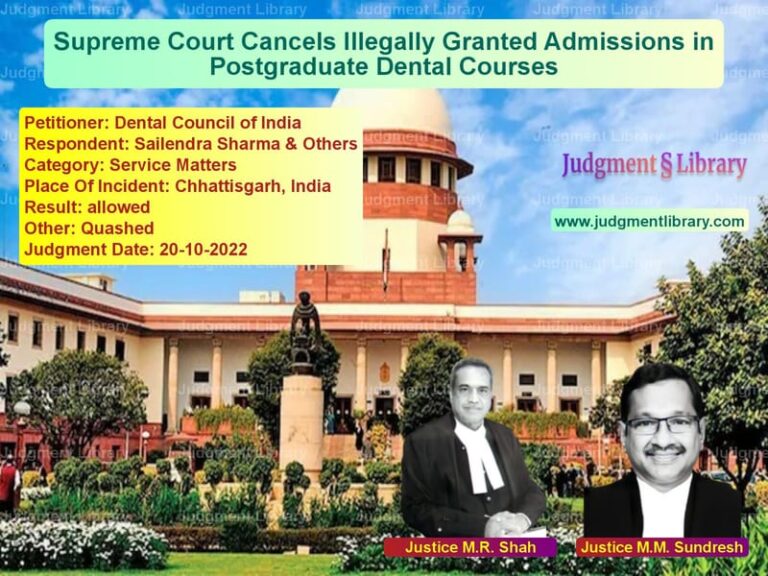Forest Law and Vehicle Seizure: Kerala High Court’s Ruling on Confiscation Under Section 61-A
The case of State of Kerala v. Jossy Sequeria dealt with the legality of confiscation of a vehicle under the Kerala Forest Act, 1961. The Supreme Court examined the correctness of the High Court’s decision quashing the confiscation order against a vehicle allegedly used for illegal transportation of forest produce. The judgment provided clarity on the application of Section 61-A of the Kerala Forest Act and the burden of proof required to justify confiscation.
Background of the Case
The case arose from the seizure of a vehicle transporting three bags of sandalwood weighing 20 kg. On November 29, 1998, the Kerala police intercepted a jeep bearing registration number KA-12-2932. The driver, Basheer, was arrested, and the vehicle, along with the seized sandalwood, was handed over to the Assistant Wildlife Warden, Tholpetty. During the investigation, it was revealed that the vehicle belonged to the respondent, Jossy Sequeria.
The forest authorities claimed that the sandalwood was a government property being illegally transported. Consequently, a show cause notice was issued to Jossy Sequeria, asking him to justify why the vehicle should not be confiscated under Section 61-A of the Kerala Forest Act. Failing to provide a satisfactory explanation, the authorized officer passed an order on April 30, 1999, confiscating both the vehicle and the forest produce.
Legal Issues
The key legal questions in the case were:
- Whether the confiscation of the vehicle under Section 61-A of the Kerala Forest Act was legally justified.
- Whether the seized sandalwood was proved to be government property.
- Whether the burden of proof was correctly applied in the confiscation proceedings.
Arguments of the Appellant (State of Kerala)
The State of Kerala argued:
- That the vehicle was used for transporting illegally obtained forest produce, making it liable for confiscation under Section 61-A.
- That the respondent failed to provide a valid explanation for the presence of sandalwood in his vehicle.
- That forest officers have the authority to seize property when there is prima facie evidence of a forest offense.
Arguments of the Respondent (Jossy Sequeria)
Jossy Sequeria contended:
- That he had no knowledge of the illegal transport of sandalwood.
- That the confiscation order was arbitrary as there was no conclusive proof that the seized sandalwood belonged to the Kerala government.
- That the Kerala High Court’s ruling in Bhargavan v. Divisional Forest Officer (1994) had set a precedent where similar confiscations were held unlawful.
Supreme Court’s Analysis
On the Application of Section 61-A
Section 61-A of the Kerala Forest Act, 1961, empowers forest officers to seize and confiscate vehicles used in forest offenses. However, the Court emphasized that for confiscation to be legally valid, the authorities must establish that the seized goods belong to the state and that the vehicle was knowingly used for illegal transport.
Reliance on Kerala High Court’s Precedent
The Supreme Court relied on the Kerala High Court’s ruling in Bhargavan v. Divisional Forest Officer (1994), which held that confiscation requires conclusive evidence that the seized goods belong to the government. The Court stated:
“We are in agreement with the reasoning of the High Court recorded in the case of Bhargavan. The High Court was justified in deciding the issue in the light of law laid down in Bhargavan’s case.”
On the Burden of Proof
The Court found that:
- The prosecution failed to establish that the seized sandalwood belonged to the Kerala government.
- There was no evidence linking the respondent to the illegal transportation of sandalwood.
- Merely transporting goods suspected to be forest produce does not justify confiscation unless the government proves ownership.
Final Judgment
The Supreme Court dismissed the appeal, upholding the Kerala High Court’s decision to quash the confiscation order. The Court concluded:
“The seized goods in question were brought from Karnataka by the owner of the Jeep, and it could not be proved that the goods belonged to the State of Kerala. With these two findings of fact, the High Court was justified in quashing the confiscation order made under Section 61-A.”
Conclusion and Impact
This ruling reinforces the principle that confiscation under the Kerala Forest Act must be based on clear and convincing evidence. The judgment clarifies that the mere presence of suspected forest produce in a vehicle does not automatically justify its seizure. Authorities must demonstrate ownership of the seized goods and prove the vehicle’s involvement in illegal transportation beyond reasonable doubt.
The decision protects vehicle owners from arbitrary confiscation while ensuring that forest laws are applied fairly and in accordance with legal principles. It also sets a precedent for future cases where authorities seek to confiscate vehicles under forest laws without sufficient evidence.
Don’t miss out on the full details! Download the complete judgment in PDF format below and gain valuable insights instantly!
Download Judgment: State of Kerala vs Jossy Sequeria Supreme Court of India Judgment Dated 05-09-2017.pdf
Direct Downlaod Judgment: Direct downlaod this Judgment
See all petitions in Property Disputes
See all petitions in Legal Malpractice
See all petitions in Other Cases
See all petitions in Judgment by R K Agrawal
See all petitions in Judgment by Abhay Manohar Sapre
See all petitions in dismissed
See all petitions in supreme court of India judgments September 2017
See all petitions in 2017 judgments
See all posts in Civil Cases Category
See all allowed petitions in Civil Cases Category
See all Dismissed petitions in Civil Cases Category
See all partially allowed petitions in Civil Cases Category

